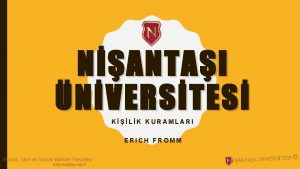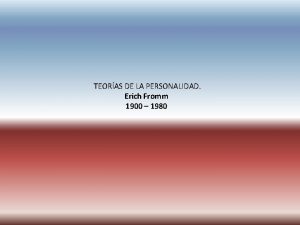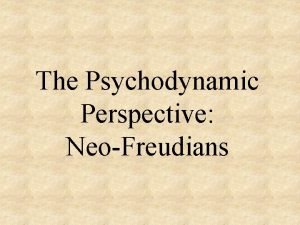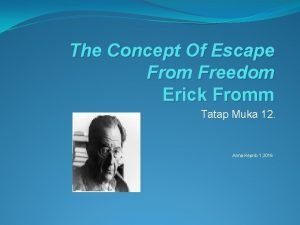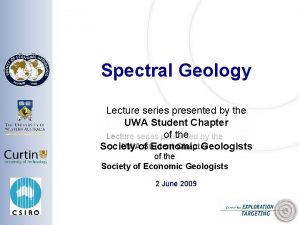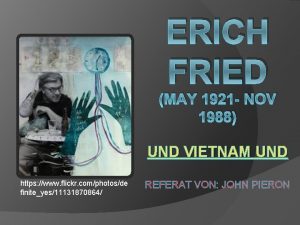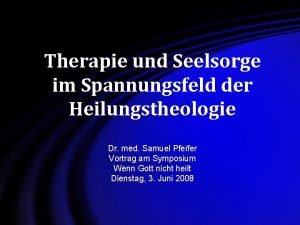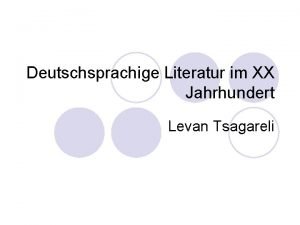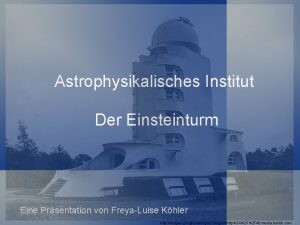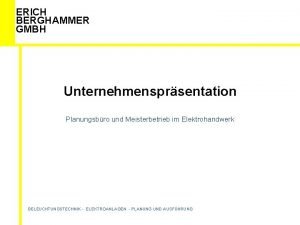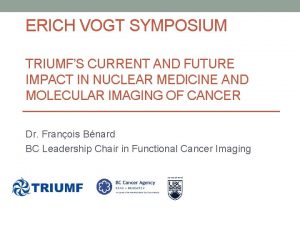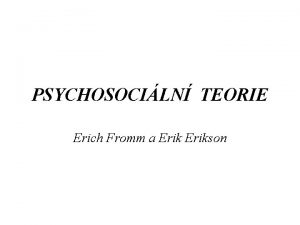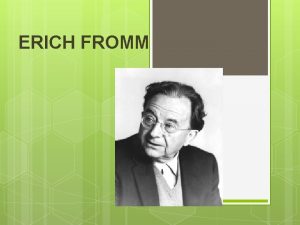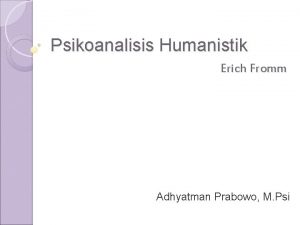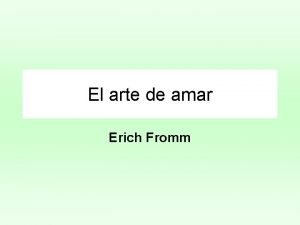1 NEOFREUDIANS Erich Seligmann Fromm Lecture Series 5















- Slides: 15

1 NEO-FREUDIANS: Erich Seligmann Fromm (Lecture Series 5) B. A. IInd (Honors) (Paper-IVth : Systems in Psychology) By Dr. Masaud Ansari Department of Psychology, A. P. S. M. College, Barauni L. N. M. University, Darbhanga 17 th AUGUST 2020

2 Neo-Freudian’s view Freud’s writings were controversial, but they soon attracted followers, mostly young, ambitious physicians who formed an inner circle around their strong minded leader. These pioneering psychoanalysts, whom we often call neo- Freudians, accepted Freud’s basic ideas: the personality structures of id, ego, and superego; the importance of the unconscious; the shaping of personality in childhood; and the dynamics of anxiety and the defense mechanisms. But they broke off from Freud in two important ways. First, they placed more emphasis on the conscious mind’s role in interpreting experience and in coping with the environment. And second, they doubted that sex and aggression were all - consuming motivations. Instead, they tended to emphasize loftier motives and social interactions.

3 Neo-Freudian referring to modifications, extensions, or revisions of Freud’s original psychoanalytic theory, most commonly to those that emphasize social, cultural and interpersonal elements rather than innate biological instincts such as sexuality and aggressio. Major theorists described as neo-Freudian are 1. Alfred Adler (1870 -1937) 2. Karen Horney (1885 -1952) 3. Erich Seligmann Fromm (1900 -1980) 4. Harry Stack-Sullivan (1892 -1943) 5. Erik Homburger Erikson (1902 – 1994)

4 Neo-Freudian’s major Disagreements with Freud 1. Socio-cultural factors determine conflicts, not instincts. 2. Infantile sexuality is of little importance compared to socio-cultural factors. Conflicts can be or are predominantly non-sexual. 3. Societal factors cause anxiety, not a defense. 4. Dream have no latent content: could be metaphorical expressions of the patient’s real concern or reflect struggles to achieve self-awareness and responsibility. 5. Oedipal complex has no sexual component, is due to interpersonal/social factors. 6. Techniques of treatment: normally emphasize ‘here and now’, de-emphasis on past, gaining insight etc.

5 Neo-Freudian’s views 1. The social and cultural, rather than biological factors are basic to the understanding of the human nature. 2. The Oedipus complex, the formation of superego and alleged inferiorities are cultural though there may be a biological foundation for oral and anal stage, it can be modified by cultural factors. 3. Emphasis is placed on ‘interpersonal relationship’ in the formation of character and the production of anxiety. 4. It is not the sexual behaviour that determines character but the character determines the sexual behaviour.

6 Contribution of neo-Freudians There are five major contributors of neo-Freudian period of psychology: 1. Alfred Adler 2. Karen Horney 3. Erich Fromm 4. Harry Stack-Sullivan 5. Erik Homburger Erikson Here we will discuss only one i. e. Erich Seligmann Fromm’s contribution while rest of the psychologists will be discussed later…

7 3. Erich Seligmann Fromm (1900 -1980) Seligmann was a German Jew who fled the Nazi regime and settled in the US. He was a social psychologist, psychoanalyst, sociologist, humanistic philosopher, and democratic socialist. He was one of the Founders of The William Alanson White Institute of Psychiatry, Psychoanalysis and Psychology in New York City and was associated with the Frankfurt School of critical theory. Fromm studied at the University of Heidelberg, where he began studying sociology under Alfred Weber (brother of the better known sociologist Max Weber), psychiatrist-philosopher Karl Jaspers, and Heinrich Rickert. Fromm received his Ph. D in sociology from Heidelberg in 1922. During the mid-1920 s, he trained to become a psychoanalyst through Frieda Reichmann's psychoanalytic sanatorium in Heidelberg. They married in 1926, but separated shortly after and divorced in 1942. He began his own clinical practice in 1927. In 1930 he joined the Frankfurt Institute for Social Research and completed his psychoanalytical training.

8 Seligmann’s contribution to Psychological theory The Beginning with his first seminal work of 1941, Escape from Freedom (known in Britain as Fear of Freedom), Fromm's writings were notable as much for their social and political commentary as for their philosophical and psychological underpinnings. Indeed, Escape from Freedom is viewed as one of the founding works of political psychology. His second important work, Man for Himself: An Inquiry into the Psychology of Ethics, first published in 1947, continued and enriched the ideas of Escape from Freedom. Taken together, these books outlined Fromm's theory of human character, which was a natural outgrowth of Fromm's theory of human nature. Fromm's most popular book was The Art of Loving, an international bestseller first published in 1956, which recapitulated and complemented theoretical principles of human nature found in Escape from Freedom and Man for Himself—principles which were revisited in many of Fromm's other major works.

9 Conti… Fromm considered love to be an interpersonal creative capacity rather than an emotion, and he distinguished this creative capacity from what he considered to be various forms of narcissistic neuroses and sado-masochistic tendencies that are commonly held out as proof of "true love". Indeed, Fromm viewed the experience of "falling in love" as evidence of one's failure to understand the true nature of love, which he believed always had the common elements of care, responsibility, respect, and knowledge. Drawing from his knowledge of the Torah, Fromm pointed to the story of Jonah, who did not wish to save the residents of Nineveh from the consequences of their sin, as demonstrative of his belief that the qualities of care and responsibility are generally absent from most human relationships. Fromm also asserted that few people in modern society had respect for the autonomy of their fellow human beings, much less the objective knowledge of what other people truly wanted and needed.

10 Conti… Fromm believed that freedom was an aspect of human nature that we either embrace or escape. He observed that embracing our freedom of will was healthy, whereas escaping freedom through the use of escape mechanisms was the root of psychological conflicts. Fromm outlined three of the most common escape mechanisms: § Automaton conformity: changing one's ideal self to conform to a perception of society's preferred type of personality, losing one's true self in the process; Automaton conformity displaces the burden of choice from self to society; § Authoritarianism: giving control of oneself to another. By submitting one's freedom to someone else, this act removes the freedom of choice almost entirely. § Destructiveness: any process which attempts to eliminate others or the world as a whole, all to escape freedom. Fromm said that "the destruction of the world is the last, almost desperate attempt to save myself from being crushed by it".

11 § Erich Fromm postulated eight basic needs Need Description Transcendence Being thrown into the world without their consent, humans have to transcend their nature by destroying or creating people or things. Humans can destroy through malignant aggression, or killing for reasons other than survival, but they can also create and care about their creations. Rootedness is the need to establish roots and to feel at home again in the world. Productively, rootedness enables us to grow beyond the security of our mother and establish ties with the outside world. With the nonproductive strategy, we become fixated and afraid to move beyond the security and safety of our mother or a mother substitute. Sense of Identity The drive for a sense of identity is expressed nonproductively as conformity to a group and productively as individuality. Frame of orientation Understanding the world and our place in it. Unity A sense of oneness between one person and the "natural and human world outside. " Effectiveness The need to feel accomplished. Excitation and Stimulation Actively striving for a goal rather than simply responding.

12 § Five basic orientations of Seligmann lists four types of nonproductive character orientation, and one positive character orientation. While he put first four orientations under non-productive one and a single one under productive orientation: 1. Receptive 2. Exploitative 3. Hoarding 4. Marketing 5. Productive

13 Conti… Receptive and exploitative orientations are basically how an individual may relate to other people and are socialization attributes of character. A hoarding orientation is an acquiring and assimilating materials/valuables character trait. The marketing orientation arises in response to the human situation in the modern era. The current needs of the market determine value. It is a relativistic ethic. In contrast, the productive orientation is an objective ethic. Despite the existential struggles of humanity, each human has the potential for love, reason and productive work in life. Seligmann writes, "It is the paradox of human existence that man must simultaneously seek for closeness and for independence; for oneness with others and at the same time for the preservation of his uniqueness and particularity the answer to this paradox – and to the moral problems of man – is productiveness. "

14 § Critique of Freud Seligmann examined the life and work of Sigmund Freud at length. Fromm identified a discrepancy between early and later Freudian theory: namely that, prior to World War I, Freud had described human drives as a tension between desire and repression, but after the end of the war, began framing human drives as a struggle between biologically universal Life and Death (Eros and Thanatos) instincts. Fromm charged Freud and his followers with never acknowledging the contradictions between the two theories. Fromm also criticized Freud's dualistic thinking. According to Fromm, Freudian descriptions of human consciousness as struggles between two poles were narrow and limiting. Fromm also condemned Freud as a misogynist unable to think outside the patriarchal milieu of early 20 th century Vienna. However, in spite of these criticisms, Fromm nonetheless expressed a great respect for Freud and his accomplishments. Fromm contended that Freud was one of the "architects of the modern age", alongside Albert Einstein and Karl Marx, but emphasized that he considered Marx both far more historically important than Freud and a finer thinker.

15 Thank You
 Henning kurz
Henning kurz Pengertian cinta kasih menurut erich fromm yaitu
Pengertian cinta kasih menurut erich fromm yaitu Fromm varoluşsal ihtiyaçlar
Fromm varoluşsal ihtiyaçlar Personalidad erich fromm
Personalidad erich fromm Neofreudianism
Neofreudianism Erick fromm
Erick fromm Fromm engineering
Fromm engineering 01:640:244 lecture notes - lecture 15: plat, idah, farad
01:640:244 lecture notes - lecture 15: plat, idah, farad Geology lecture series
Geology lecture series Dcac lecture series
Dcac lecture series Erich fried biographie
Erich fried biographie Erich reber krank
Erich reber krank Gebranntes kind erich fried
Gebranntes kind erich fried Erich mendelsohn einsteinturm
Erich mendelsohn einsteinturm Erich berghammer
Erich berghammer Erich vogt
Erich vogt


